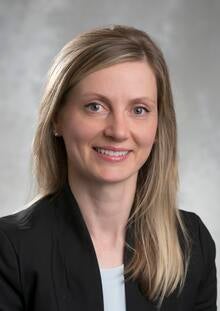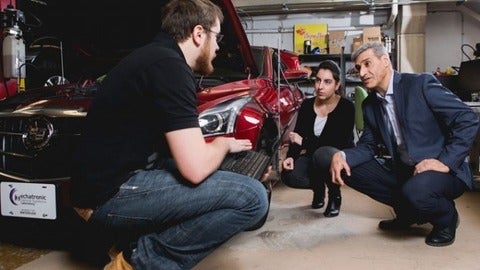Waterloo researchers awarded $10.9 million for additive manufacturing network
Holistic Innovation in Additive Manufacturing (HI-AM 2.0)
From process optimization to multi-scale modeling and machine learning, Waterloo researchers receive widespread support to develop technologies of the future
What sets Waterloo apart are our multi-disciplinary approaches to research with deep connections with industry. Thanks to major funding, a group of researchers is set to make a meaningful impact, advancing sustainable innovation and training the next generation of leaders in From process optimization to multi-scale modeling and machine learning, Waterloo researchers receive widespread support to develop technologies of the futurethe additive manufacturing, or 3D printing, sector.
The Holistic Innovation in Additive Manufacturing (HI-AM 2.0) project will focus on training highly qualified professionals (HQPs) and developing technologies that reduce the environmental footprint of advanced manufacturing. The work builds on the previous HI-AM Network that worked to address the challenges that prevented the industrial adoption of metal AM and equip Canada for the ongoing disruptions in manufacturing as a result of digital technologies and geopolitical contexts.
The newest project is supported by two grants totaling $10.9 million from the Natural Sciences and Engineering Research Council of Canada (NSERC) and Mitacs, as well as funding from industry partners from sectors such as aerospace, automotive and energy.
“The announcement of HI-AM 2.0 is a testament to the success of the original project and will continue to accelerate the industrial adoption of metal additive manufacturing in Canada,” says Charmaine Dean, vice-president, Research and International. “Importantly, the project will also train the next generation of HQPs who will ensure that the sector continues to grow and thrive, thus strengthening our economy. HI-AM 2.0 is just the latest example of how Waterloo successfully partners with industry and with other academic institutions to maximize resources and impact.”
The original HI-AM Network ran from 2017 to 2024 and brought together 19 leading AM experts from several Canadian universities. The network set out to train 78 HQPs at different stages in their academic careers, ultimately exceeding that goal by training more than 140 individuals, who lent their expertise in various industry sectors to drive growth across the country.
Among them are two PhD students who founded Retinex, a start-up that advances quality assurance for laser AM and welding applications.
Today, many industries benefit from the HI-AM group’s innovations, including automotive, aerospace, energy, engineering, AM material suppliers, and original equipment manufacturers.
 "As the original network was nearing its conclusion, we received widespread support and encouragement from stakeholders to continue the initiative in some form, which underscored the success of the original program and highlighted the ongoing demand for large-scale collaborative research on disruptive technologies in Canada," says Dr. Ehsan Toyserkani, engineering professor, Canada Research Chair in AM, and director of HI-AM 2.0.
"As the original network was nearing its conclusion, we received widespread support and encouragement from stakeholders to continue the initiative in some form, which underscored the success of the original program and highlighted the ongoing demand for large-scale collaborative research on disruptive technologies in Canada," says Dr. Ehsan Toyserkani, engineering professor, Canada Research Chair in AM, and director of HI-AM 2.0.
With the strong demand for this network, a total of 17 collaborative projects have been approved under HI-AM 2.0, each designed to tackle challenges hindering the industrial adoption of metal AM. The research covers a broad range of topics, including process optimization for advanced alloys, multi-scale modelling, digital twin modelling, machine learning applications in quality assurance for AM and efforts to scale production through multi-laser and large-envelope processes.
 “The role played by our private sector, not-for-profit and government partners in the success of this large-scale initiative cannot be overstated," says Dr. Mihaela Vlasea, associate director of HI-AM 2.0 and associate professor in the Department of Mechanical and Mechatronics Engineering. "Collectively, our partners bring access to high-caliber Canadian talent, as well as diverse levels of experience with additive manufacturing. Through low-risk, high-impact research projects, we can guide businesses in adopting more sustainable technologies from a design, material, performance, and cost perspective.”
“The role played by our private sector, not-for-profit and government partners in the success of this large-scale initiative cannot be overstated," says Dr. Mihaela Vlasea, associate director of HI-AM 2.0 and associate professor in the Department of Mechanical and Mechatronics Engineering. "Collectively, our partners bring access to high-caliber Canadian talent, as well as diverse levels of experience with additive manufacturing. Through low-risk, high-impact research projects, we can guide businesses in adopting more sustainable technologies from a design, material, performance, and cost perspective.”
HI-AM 2.0 will continue to bring together leading research, academic and industry partners from across the country to develop materials and processes to advance AM. The program will support Canadian businesses and help position the country as a pioneer in the application and development of innovative AM technologies.
The University of Waterloo acknowledges the support from the Natural Sciences and Engineering Research Council of Canada (NSERC) Alliance and the NSERC Alliance-MitacsAccelerate Fund.
For more information on NSERC and Mitacs, visit their websites below:






